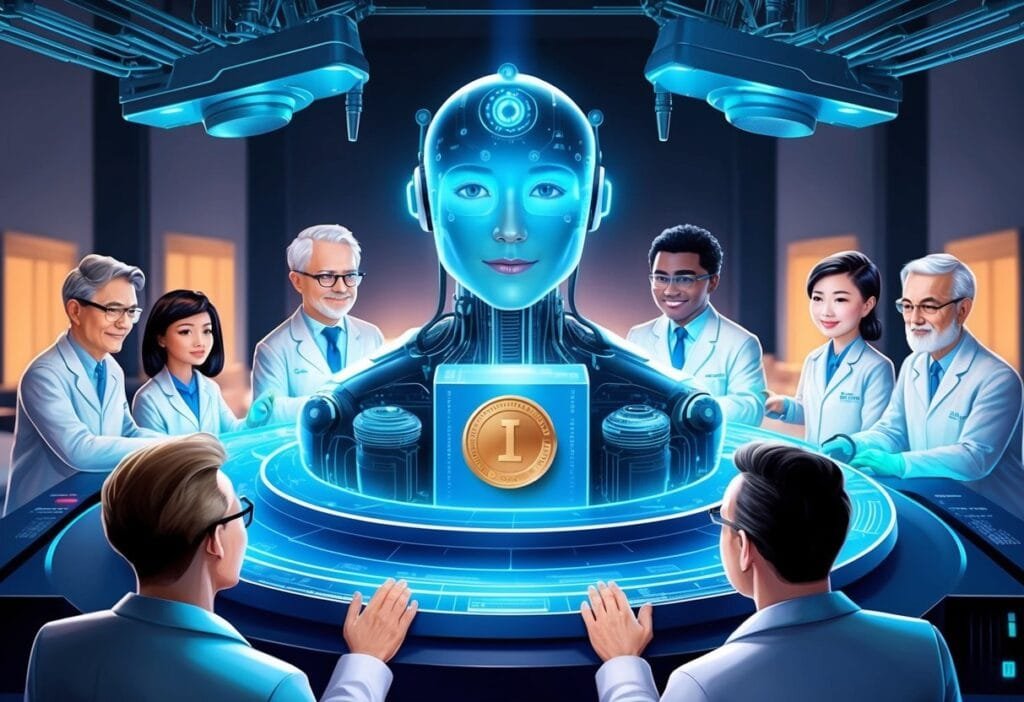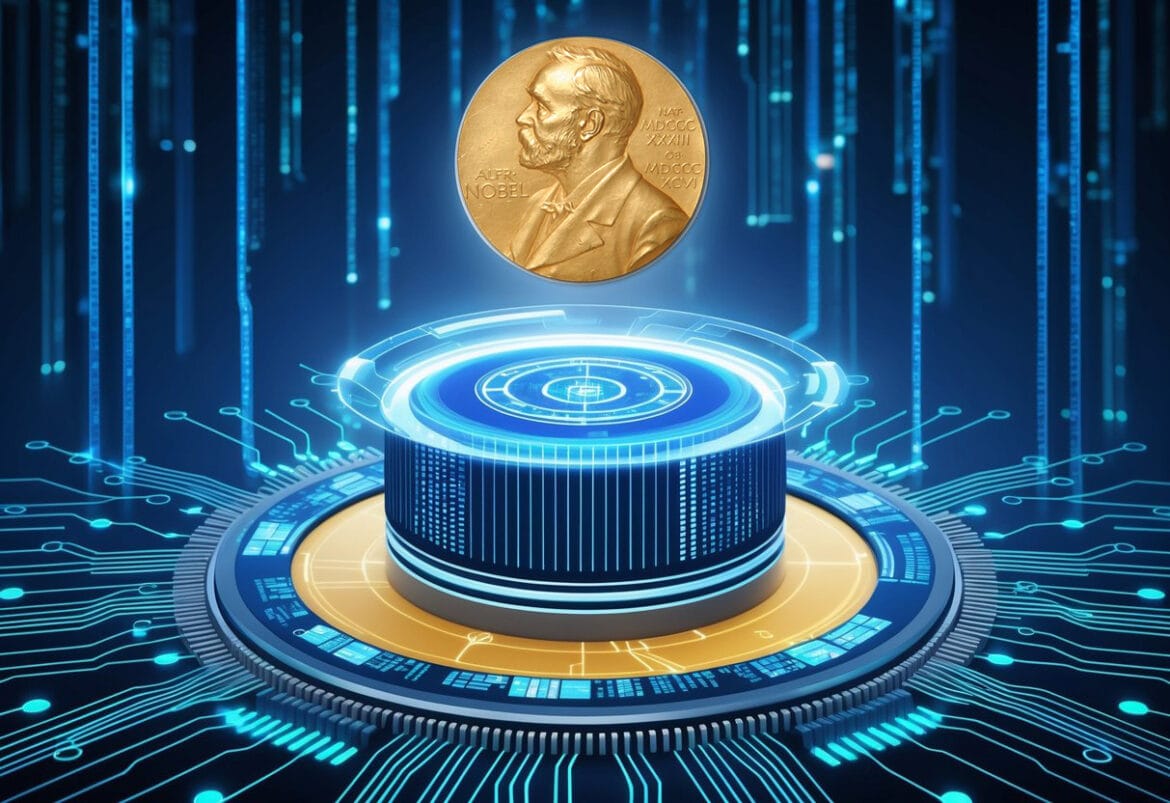Table of Contents
The Nobel Prize 2024 For Artificial Intelligence (AI) in Physics has recognized groundbreaking work in artificial intelligence. Two pioneers in the field, John Hopfield and Geoffrey Hinton, received the award for their key discoveries in machine learning. Their work laid the foundation for how AI systems learn and process information today.

These scientists made important advances that helped computers learn more like human brains. Their research opened up new possibilities in AI that we now see in things like speech recognition and image processing. The Nobel committee highlighted how their discoveries shaped modern machine learning methods.
The prize shows how AI research has become a major force in science. It reflects the growing impact of artificial intelligence across many areas of society. At the same time, it raises questions about the future development and use of AI technologies.
Summary
- Hopfield and Hinton won the 2024 Nobel Prize in Physics for AI breakthroughs
- Their work formed the basis for modern machine learning techniques
- This award highlights AI’s increasing importance in science and society
Overview of the Nobel Prize in Physics

The Nobel Prize in Physics honors groundbreaking discoveries that push the boundaries of scientific understanding. It celebrates achievements that shape our knowledge of the physical world and impact technological progress.
Significance of the Nobel Prize
The Nobel Prize in Physics is one of the most prestigious awards in science. It recognizes outstanding contributions to physics, often leading to major technological advancements. Winners gain worldwide recognition and their work often influences future research directions.
The prize has highlighted many fundamental discoveries. These include the theory of relativity, quantum mechanics, and the detection of gravitational waves. Such breakthroughs have changed our understanding of the universe.
Nobel laureates often become prominent voices in science. Their work inspires new generations of physicists and can attract funding to promising research areas.
History and Evolution
The Nobel Prize in Physics was established in 1901 as part of Alfred Nobel’s will. It was one of the five original Nobel Prizes.
Early prizes focused on classical physics and electromagnetism. As science progressed, awards expanded to cover quantum mechanics, particle physics, and astrophysics.
Notable milestones include:
- 1903: Marie Curie becomes the first woman laureate
- 1921: Albert Einstein wins for his work on the photoelectric effect
- 1957: First prize awarded for work in condensed matter physics
The prize has adapted to recognize emerging fields. Recent awards have honored discoveries in cosmology, exoplanets, and artificial intelligence.
Criteria for Nobel Physics Prize Selection
The Royal Swedish Academy of Sciences selects the Nobel Prize in Physics winners. Their process is rigorous and confidential.
Key selection criteria include:
- Originality: Work must be pioneering in nature
- Impact: Discoveries should significantly advance physics or related fields
- Verification: Results must be confirmed by the scientific community
Nominations come from invited experts worldwide. The Nobel Committee for Physics reviews these nominations and makes recommendations to the Academy.
The prize can be shared by up to three individuals. It’s not awarded posthumously, except in rare cases where the winner dies after the announcement.
Winners Of Nobel Prize 2024 for Artificial Intelligence (AI) in Physics

The 2024 Nobel Prize in Physics recognized two pioneering researchers for their groundbreaking work in artificial intelligence. John Hopfield and Geoffrey Hinton received the prestigious award for their foundational discoveries and inventions in machine learning with artificial neural networks.
John Hopfield’s Contributions
John Hopfield made significant advances in the field of artificial neural networks. His most notable work was the development of the Hopfield network, a type of recurrent artificial neural network. This network can learn and store information, mimicking the human brain’s ability to recall memories.
Hopfield’s model provided a new framework for understanding how neural networks process and store information. His research helped bridge the gap between neuroscience and computer science, paving the way for more advanced AI systems.
The Hopfield network found applications in various fields, including pattern recognition and optimization problems. It demonstrated how simple components could work together to solve complex tasks, a key principle in modern AI development.
Geoffrey Hinton’s Impact
Geoffrey Hinton, often called the “godfather of AI,” made crucial contributions to deep learning. His work on backpropagation algorithms revolutionized the training of neural networks, enabling them to learn from large datasets more efficiently.
Hinton’s research on deep belief networks and restricted Boltzmann machines laid the foundation for modern deep learning architectures. These innovations led to significant improvements in image and speech recognition technologies.
His work on distributed representations and neural network training techniques helped overcome previous limitations in AI. Hinton’s contributions have been instrumental in the rapid advancements in machine learning over the past decade.
Collaborative Achievements in AI
While Hopfield and Hinton worked independently, their combined efforts significantly advanced the field of AI. Their research complemented each other, with Hopfield focusing on network dynamics and Hinton on learning algorithms.
Together, their work formed the building blocks of machine learning as we know it today. The synergy between their theories has enabled the development of more sophisticated AI systems capable of tackling complex problems.
The Nobel Committee recognized their collaborative impact on the field, noting how their individual contributions came together to create a powerful framework for AI research and development. This acknowledgment highlights the importance of diverse approaches in advancing scientific knowledge.
Influence on Machine Learning and AI Systems

The Nobel Prize-winning work of Hopfield and Hinton fundamentally shaped modern artificial intelligence. Their discoveries laid the groundwork for today’s advanced AI systems and continue to drive innovation in the field.
Developments in Artificial Neural Networks
Artificial neural networks form the backbone of many AI systems. Hopfield’s work on associative memory networks in the 1980s was groundbreaking. These networks could store and retrieve information similar to how human brains work.
Hinton’s contributions were equally important. He developed the Boltzmann machine, a type of neural network that can learn internal representations. This was a big step forward in machine learning.
Their work helped solve key problems in AI, like pattern recognition and decision-making. It opened up new ways to process complex data and make predictions.
Application of Physics in Machine Learning
Physics principles play a crucial role in machine learning algorithms. Hopfield and Hinton applied concepts from statistical physics to develop their methods.
The use of physics in AI led to more efficient and powerful models. It allowed researchers to create systems that could handle larger amounts of data and more complex tasks.
This approach helped bridge the gap between theoretical physics and practical AI applications. It showed how ideas from one field could revolutionize another.
Future Implications of the Discoveries
The work of Hopfield and Hinton continues to shape the future of AI. Their discoveries are the building blocks of machine learning that power many modern technologies.
These breakthroughs have led to advances in:
- Image and speech recognition
- Natural language processing
- Autonomous vehicles
- Medical diagnosis
As AI becomes more integrated into daily life, the impact of their work grows. It’s likely to lead to new breakthroughs in fields like quantum computing and brain-computer interfaces.
The Nobel Prize recognition highlights the growing importance of AI research. It may inspire more funding and interest in the field, potentially speeding up future discoveries.
Ethical and Practical Application

The Nobel Prize in Physics 2024 recognizes groundbreaking work in artificial intelligence. This raises important questions about the responsible use of AI technology and its effects on society.
Advancements in Technology
AI systems have made huge strides in recent years. They can now perform complex tasks like image recognition, language translation, and game playing at superhuman levels.
Machine learning allows AI to improve its performance over time without being explicitly programmed. This has led to breakthroughs in fields like healthcare, finance, and transportation.
Some key AI applications include:
- Medical diagnosis and drug discovery
- Autonomous vehicles
- Personal digital assistants
- Financial trading algorithms
- Content recommendation systems
As AI capabilities grow, its potential impact on society and the economy continues to expand rapidly.
Ethical Considerations in AI
The power of AI raises important ethical concerns that must be addressed. Bias in AI systems can lead to unfair or discriminatory outcomes, especially for marginalized groups.
Privacy is another major issue, as AI often relies on huge datasets of personal information. There are also worries about AI being used for surveillance or manipulation of human behavior.
Transparency and accountability are crucial. It should be clear how AI systems make decisions that affect people’s lives.
The risks of advanced AI systems becoming uncontrollable or misaligned with human values must be taken seriously. Proper safeguards and oversight are needed.
Responsibilities and Impact on Society
Humans carry the responsibility for the ethical development and deployment of AI. Policymakers, tech companies, and researchers must work together to create guidelines for AI safety and ethics.
Education is key. The public needs to understand AI’s capabilities and limitations. Workers may need retraining as AI automates more jobs.
AI could help solve major global challenges in areas like climate change, disease, and poverty. But its benefits must be shared equitably across society.
Ongoing research into AI alignment – ensuring AI systems remain beneficial to humanity – is critical. The choices made now will shape the long-term impact of this powerful technology.
Recognition and Response

The 2024 Nobel Prize in Physics honored groundbreaking work in artificial intelligence. This award marks a significant milestone for the AI field and has sparked global discussions on its far-reaching implications.
Reception of the Award
Geoffrey Hinton from the University of Toronto and John Hopfield from Princeton University were awarded the 2024 Nobel Prize in Physics. The Nobel Committee for Physics praised their pioneering contributions to AI research.
Many in the scientific community expressed surprise at AI research winning a physics prize. This decision highlights the increasing overlap between computer science and physics.
The Chair of the Nobel Committee emphasized the transformative potential of AI technologies across various scientific disciplines. Hinton and Hopfield’s work on neural networks was recognized as foundational to modern AI systems.
Global Impact of the Award Announcement
The announcement generated widespread media coverage and public interest in AI advancements. It sparked debates about the ethical implications and potential societal impacts of AI technologies.
Universities and research institutions worldwide reported increased interest in AI-related programs and courses. This surge reflects growing awareness of AI’s importance in future scientific and technological developments.
The award also prompted discussions about the need for interdisciplinary approaches in scientific research. It underscored the blurring lines between traditional academic disciplines in the face of emerging technologies.
Governments and policymakers took note, with some calling for increased funding and support for AI research and development initiatives.

